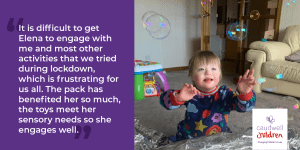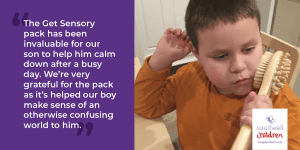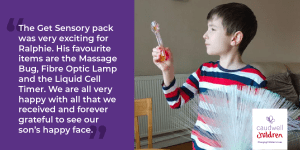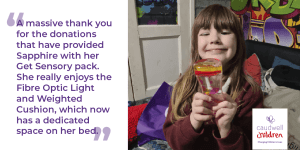During the Covid-19 pandemic we’re providing vital packs to help disabled children and their families access sensory processing activities at home. Donate or apply here.
At Caudwell Children we also offer a range of services and support for disabled children and their families, including 28-day Autism Spectrum Disorder diagnoses, in Staffordshire and across the UK.
Our perception of touch helps our brains to understand the immediate environment around us, including the shape, texture and temperature of the things we interact with.
So, what is sensory processing and why is it vital for disabled children?
Sensory processing is the act of receiving and organising information
Sensory processing – and therefore sensory play for children – is important for interpreting sight, taste, touch, smell and sound.
In simple terms it is the way our brains receive, organise and respond to sensory input in a meaningful & consistent manner.
Nurturing the senses helps children better understand themselves and the world. Children who have difficulty processing sensory information may have what is known as Sensory Processing Disorder.
With many venues closed right now, our specialist team of clinicians have put together a specially-designed pack of items to stimulate sensory play at home.
These can be used together or alone to help disabled children and families connect and learn using sensory play – any time, anywhere.
You can get your very own Get Sensory Pack here.
Children with disabilities can have too little or too much sensory stimulation
Children with disabilities can sometimes have too little or too much sensory stimulation. Leaving them feeling restless or overwhelmed.
Sensory toys can help regulate that arousal level, such as by applying varying pressure with the Massage Bug or 4-Ball Massager in our Get Sensory Pack. You could also use the Fibre Optic Lamp to stimulate touch and sight. Or provide a reassuring distraction with the Sisal Brush.
Sensory play can help disabled children improve co-ordination
Because our senses are connected to how we interpret the world, sensory play is great for co-ordination. The combination of smell, sight & touch senses can help motivate a child’s motor skills.
All of the toys in our Get Sensory Packs can be used in different intensities, fitting a child’s individual needs. For example, the Scented Bubbles can be blown one-by-one or in bursts.
Sensory objects such as our Liquid Cell Timer can also teach the concept of time – particularly helpful when home-schooling – and engage sight and touch.
Everyday activities can be hard if a child feels under- or over-stimulated
If a child doesn’t like certain types of textures or touch, sensory toys can be a great way to gently expose them to these sensations.
Sitting a Weighted Cushion on a children’s lap can help them relax and concentrate.
Setting up an obstacle course using Spikey Domes can build co-ordination, balance and make learning fun.
Exploring different noises and levels of sound can help prepare children for new situations. Our semi-transparent crinkly Space Blanket is perfect to try this out.
You can donate a Get Sensory pack, or one of the individual items, to help a disabled child – or apply for a pack of your own – here.
We’re helping thousands of children across the UK. Here are some of their stories, in their parents’ words explaining how sensory processing and sensory play is helping them.
Elena

Grzegorz

Morgan

Ralphie

Sapphire

More from Caudwell Children
If you or your child would like to join more regular fun and exciting activities provided by Caudwell Children why not sign-up for our Short Breaks Activity Clubs? They’re free for Staffordshire children aged 8-18.
We know how tough things are right now and Caudwell Children has lots of support on offer for disabled children and their families. All the information about how we’re supporting families during the lockdown can be found here.
)

)
)
)
)